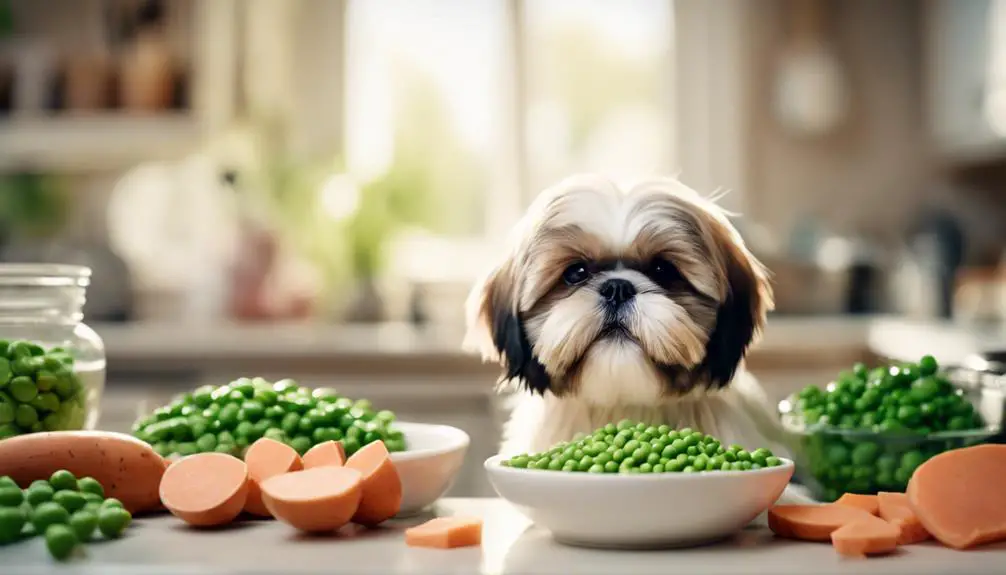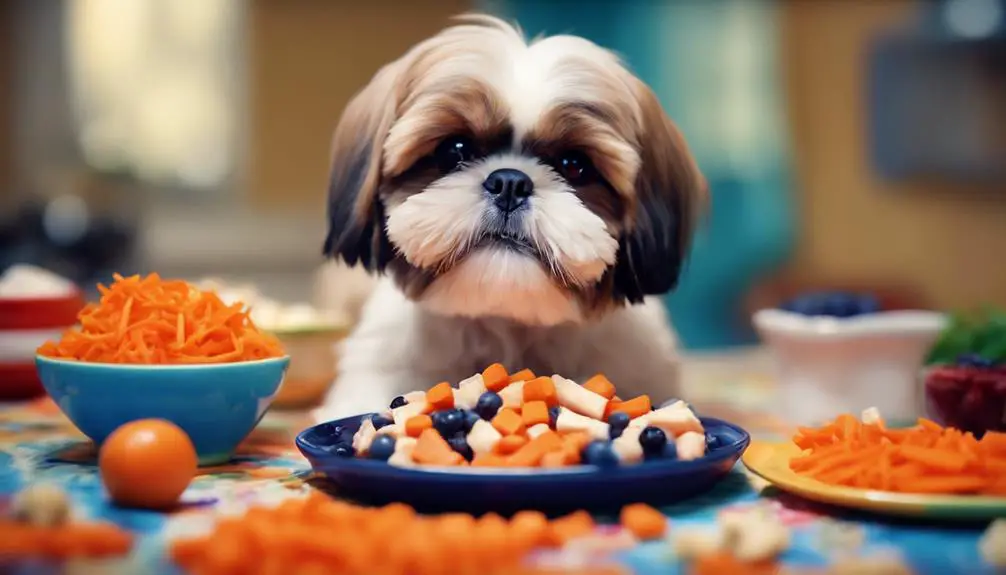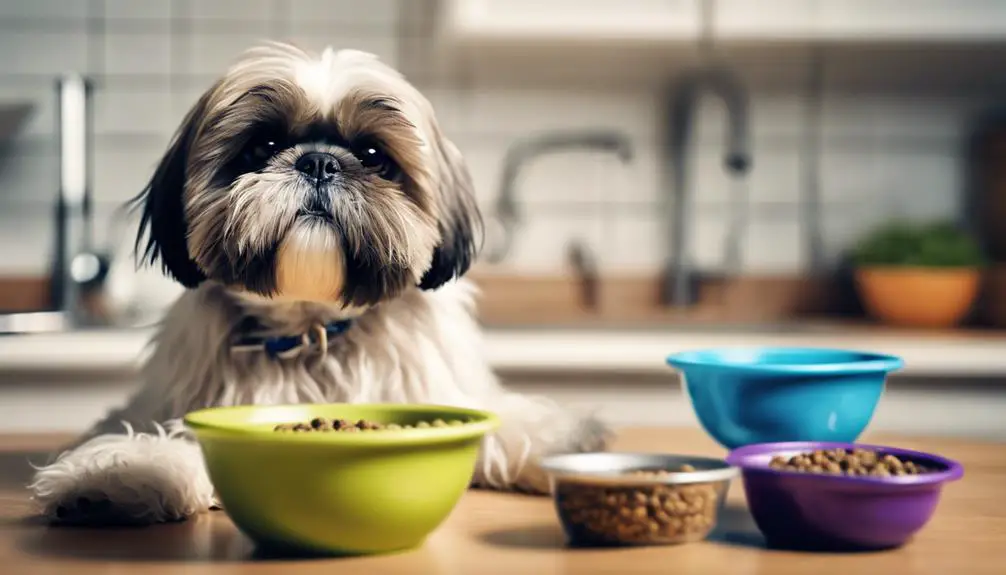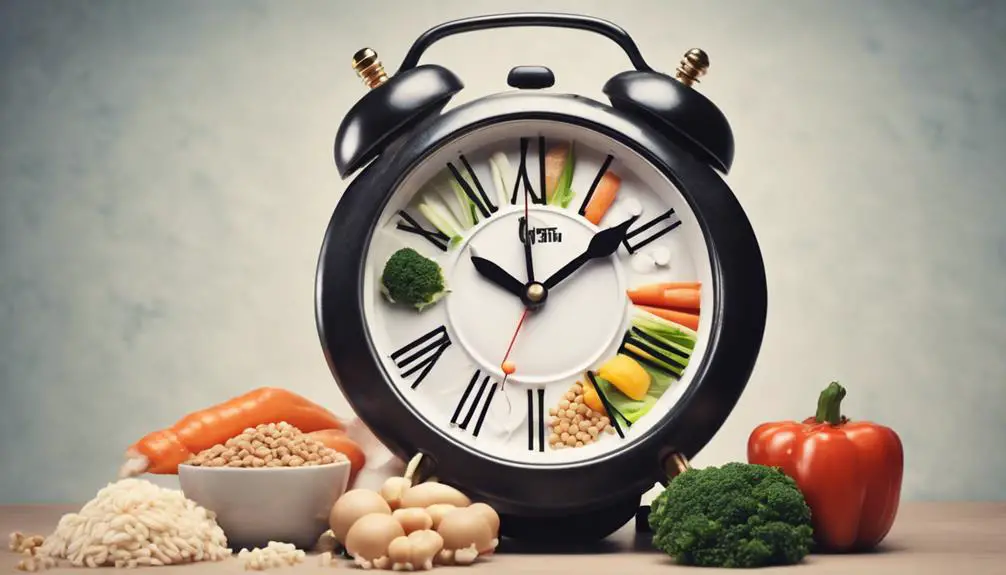When it comes to nourishing your Shih Tzu, selecting the right food can make all the difference in their health and energy levels. You've likely noticed a bustling market of pet food choices, but not all are suited for your furry friend's unique needs. High-quality proteins, crucial for their muscle maintenance, and specific fruits and vegetables that boost their immune system, are essential. But have you considered the impact of certain treats and snacks? Let's explore which options will enhance your Shih Tzu's wellbeing and those that might not be as beneficial as they seem. What might some of these be?
Understanding Shih Tzu Nutritional Needs

To guarantee your Shih Tzu's health and vitality, it's important to understand their specific dietary requirements, which differ greatly from those of larger breeds. Shih Tzus require a balanced diet rich in certain nutrients that support their unique physiological and metabolic needs.
Firstly, consider their energy requirements. Despite their small size, Shih Tzus are relatively energetic and therefore need a diet with an appropriate caloric content to maintain their energy levels without risking obesity. It's essential to adjust their caloric intake based on their age, activity level, and metabolic rate.
Furthermore, Shih Tzus often suffer from dental issues due to their small mouths. Feeding them kibble that's specifically designed to help reduce plaque and tartar buildup can be beneficial. Additionally, these dogs can be prone to allergies, so incorporating hypoallergenic foods into their diet may prevent skin and digestive issues.
Lastly, consider their digestive health. Shih Tzus benefit from diets that include easily digestible carbohydrates and fibers which aid in gastrointestinal health and promote regular bowel movements.
You'll also want to make sure they're adequately hydrated, as proper hydration is essential for maintaining their kidney and urinary tract health.
The Importance of Protein Sources

Understanding the nutritional needs of your Shih Tzu, let's now focus on the role of protein sources in their diet. Protein is vital for your dog's growth, maintenance, and overall health. It's essential for building muscle, repairing tissues, and supporting immune function. A lack of adequate protein can lead to various health issues, including muscle loss and a weakened immune system.
When selecting proteins for your Shih Tzu, you should aim for high-quality sources that are easily digestible. Animal-based proteins like chicken, turkey, beef, and fish are excellent choices because they contain all the essential amino acids your pet needs. These sources provide the right balance of nutrients without excessive calories that can lead to weight gain.
It's also important to take into account the preparation of these proteins. Cooked meats are safer for your Shih Tzu, as raw diets can sometimes carry risks of bacterial infections such as salmonella.
When incorporating these protein sources into your pet's diet, make sure they make up a balanced portion of their overall intake. Overloading on protein can be just as harmful as a deficiency, potentially leading to kidney strain.
Best Fruits and Vegetables

Incorporating a variety of fruits and vegetables into your Shih Tzu's diet can greatly enhance their overall health. These natural foods are rich in essential nutrients that support various bodily functions.
For instance, carrots are excellent for your pet's vision due to their high beta-carotene content which converts to vitamin A in the body. They're also good for dental health, as chewing them can help remove plaque.
Apples, without the seeds and core, provide a good source of vitamins A and C, and fiber, promoting digestive health. However, you should avoid grapes and raisins as they can cause renal failure in dogs. Blueberries are superfoods for Shih Tzus, packed with antioxidants that support cellular health and reduce inflammation.
When it comes to vegetables, cooked pumpkin is beneficial for its fiber and beta-carotene. It's particularly good for digestion and can help regulate bowel movements. Green beans are another healthy option, low in calories and rich in fiber, making them a good choice for weight management.
Always introduce these foods gradually into your Shih Tzu's diet to monitor for any allergic reactions. Remember, moderation is key to keeping your furry friend healthy and happy.
Safe and Healthy Treats

Choosing safe and healthy treats for your Shih Tzu can greatly enhance their diet and overall well-being. When selecting treats, you'll want to take into account those that not only delight your furry friend but also provide nutritional benefits. Opt for treats that are high in protein and low in fat, such as lean chicken or turkey. These options are excellent for maintaining muscle health without adding unnecessary calories.
You should also take into consideration the size and texture of treats. Small, chewable treats are ideal for Shih Tzus as they accommodate their smaller mouths and help in dental health maintenance by reducing plaque build-up. Avoid treats that are too hard, as they can pose a risk to their teeth.
Furthermore, occasional fruits like blueberries or sliced apples can be excellent treats. They're rich in antioxidants and vitamins, supporting immune health and providing dietary fiber, which aids in digestion. However, it's important to serve these fruits in moderation to prevent digestive upset due to excess sugar.
Avoiding Harmful Foods

While it's important to select nutritious treats for your Shih Tzu, you must also be vigilant about avoiding foods that can harm their health. Certain common human foods can cause serious health issues in Shih Tzus, so it's essential to know what to steer clear of.
Firstly, chocolate is highly toxic to dogs, including your Shih Tzu. It contains theobromine and caffeine, which can lead to heart problems, seizures, and even death.
Similarly, onions and garlic can cause oxidative damage to red blood cells, leading to anemia. These are often hidden in cooked dishes, so always double-check the ingredients before sharing your meal.
Grapes and raisins might seem like a healthy snack, but they can cause kidney failure in dogs. The exact toxin causing this reaction isn't fully understood, but the risk is significant enough to avoid them entirely.
Additionally, foods high in fat, such as bacon or fatty cuts of meat, can lead to pancreatitis, a painful and potentially life-threatening condition.
Lastly, make sure you keep your Shih Tzu away from xylitol, a sweetener found in many sugar-free products. Xylitol can trigger a rapid insulin release, leading to hypoglycemia and liver failure. Always check product labels, especially for items like peanut butter or dental chews.
Balancing Wet and Dry Food

Balancing wet and dry food in your Shih Tzu's diet provides both nutritional variety and oral health benefits. Wet food can enhance hydration due to its high moisture content, which is especially beneficial if your Shih Tzu is reluctant to drink adequate amounts of water. This type of food also tends to be more palatable and easier for older dogs or those with dental issues to consume.
On the other hand, dry food, or kibble, is excellent for maintaining dental health. The abrasive texture helps reduce plaque and tartar buildup, promoting healthier gums and teeth.
When you're integrating both wet and dry foods into your Shih Tzu's diet, it's essential to make sure that the overall nutritional balance meets the specific requirements of your pet. This includes appropriate proportions of protein, fats, carbohydrates, vitamins, and minerals. Always opt for high-quality brands that formulate their products based on scientific research tailored to the needs of small breeds like Shih Tzus.
Moreover, you'll need to monitor your dog's weight and adjust portions accordingly to avoid overfeeding. Combining wet and dry food can sometimes lead to unintentional extra calorie intake if not carefully managed. Hence, keeping a close eye on the calorie content of both food types is vital to maintain your Shih Tzu's optimal health.
Tips for Feeding Schedules

After establishing the balance between wet and dry food, you'll need to think about how often and when to feed your Shih Tzu to optimize their health outcomes. You should aim to feed adult Shih Tzus twice a day—once in the morning and once in the evening. Puppies, however, require more frequent feeding, generally three to four times daily, to support their rapid growth and high energy levels.
Consistency is key to maintaining your dog's digestive health. Try to feed your Shih Tzu at the same times every day. This regularity helps regulate their body's internal clock and aids in smoother digestion and metabolism. The amount of food necessary varies based on your Shih Tzu's age, weight, activity level, and health condition.
Typically, the package instructions on high-quality dog food provide a good starting point, but it's advisable to consult with your vet for a tailored feeding plan.
Avoid free-feeding, which entails leaving food out all day, as it can lead to overeating and weight issues. Instead, measure each portion to manage caloric intake effectively. After feeding, remove any uneaten food to prevent spoilage and maintain hygiene.
Observing these practices will help keep your Shih Tzu healthy and happy.
Conclusion
To guarantee your Shih Tzu remains vibrant and healthy, tailor their diet to include high-quality proteins, key fruits, and vegetables, and balance between wet and dry food.
Always opt for safe treats and strictly avoid harmful foods.
Regularly consulting with your vet will help refine their diet as needed.
By managing their feeding schedule and portions, you'll help your furry friend maintain peak health. Remember, a well-fed Shih Tzu is a happy and energetic companion.


